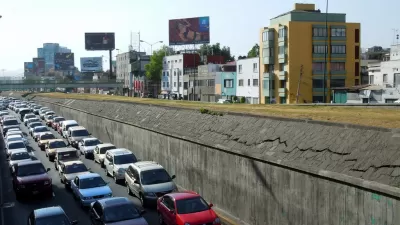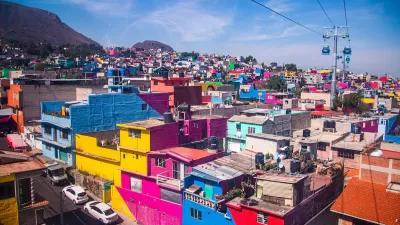Mexico City is considering a novel transit idea: two-person gondolas gliding along an aerial track. The costs of such a system may be far lower than extending the subway system.

Despite very high transit ridership, Mexico City's streets are still clogged. In response, "the city's science, technology and innovation department, known as Seciti, on Nov. 26 unveiled a prototype of an aerial transportation system that would float over the sea of cars, potholes and street protests that regularly disrupt life in the enormous metropolis."
"The solution is a kind of elevated monorail, with gondolas that run on a horizontal track, and it could really help unload the city's crowded streets, officials say. A 5km (3 mile) line could move 37 million people a year—and up to 200 million if it were extended another 10 km. For perspective, the busiest subway line transports around 290 million passengers a year." And it's not a cable car system; individual gondolas will propel themselves.
While it's still just an idea, the upside is low costs: "officials estimate the price tag for a kilometer of line would be between $9 million and $19 million, compared with $190 million for a kilometer of subway."
FULL STORY: Mexico City hopes floating gondolas will beat its appalling traffic

Planetizen Federal Action Tracker
A weekly monitor of how Trump’s orders and actions are impacting planners and planning in America.

Map: Where Senate Republicans Want to Sell Your Public Lands
For public land advocates, the Senate Republicans’ proposal to sell millions of acres of public land in the West is “the biggest fight of their careers.”

Restaurant Patios Were a Pandemic Win — Why Were They so Hard to Keep?
Social distancing requirements and changes in travel patterns prompted cities to pilot new uses for street and sidewalk space. Then it got complicated.

Platform Pilsner: Vancouver Transit Agency Releases... a Beer?
TransLink will receive a portion of every sale of the four-pack.

Toronto Weighs Cheaper Transit, Parking Hikes for Major Events
Special event rates would take effect during large festivals, sports games and concerts to ‘discourage driving, manage congestion and free up space for transit.”

Berlin to Consider Car-Free Zone Larger Than Manhattan
The area bound by the 22-mile Ringbahn would still allow 12 uses of a private automobile per year per person, and several other exemptions.
Urban Design for Planners 1: Software Tools
This six-course series explores essential urban design concepts using open source software and equips planners with the tools they need to participate fully in the urban design process.
Planning for Universal Design
Learn the tools for implementing Universal Design in planning regulations.
Heyer Gruel & Associates PA
JM Goldson LLC
Custer County Colorado
City of Camden Redevelopment Agency
City of Astoria
Transportation Research & Education Center (TREC) at Portland State University
Camden Redevelopment Agency
City of Claremont
Municipality of Princeton (NJ)





























